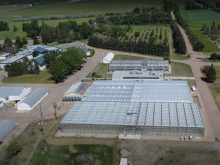As a western Canadian durum producer, I am concerned about the direction our industry is heading.
Two years ago, we had record prices for durum and the Canadian Wheat Board withheld 27 percent of the
durum crop from the market. They feared that if they marketed more that year, it would have had a negative impact on the world durum prices.
While we were withholding durum from the world markets, our competitors were free to market all of their durum at these record high prices. I am mystified how anyone could make a decision not to market into a record high priced market, but they did it, and prairie farmers paid for the decision.
Read Also

Alberta crop diversification centres receive funding
$5.2 million of provincial funding pumped into crop diversity research centres
Moving forward, after we were told to carry 27 percent of the 2008 crop into 2009, we were then told to carry a further 40 percent of 2009 production into 2010.
The PROs in March of 2009 completed the ugly story: old crop PRO was at $362 and new crop was at $300. We were effectively told to hold back $362 durum in the hopes of moving it at $300. An inverse like this is a market signal to sell inventory, not carry it. Yet the CWB did the opposite.
At $300 (CWB March 2009 PRO), durum was still attractive as the crop to include in our rotations compared to other wheats. Like a lot of other durum producers, I had visions that my 2008 and 2009 durum would be one of our better paying crops.
In the end, we compounded our carryover of durum and will end up selling into a depressed market.
The situation has not improved this year. The initial payment for my durum is $122.75 per tonne delivered into Vulcan, Alta. My net initial payment after deductions is $62.53.
With my cost of production for durum at $110.60, I am short $48.07 just to pay my bills. I know the price of this durum may increase with interim payments later in the year, but the bills won’t wait for interim payments.
Farmers can no longer afford to operate within a system that forces us to carry over substantial amounts of our production from one year to the next while bills have to be paid.
The decision to carry over production should be the farmer’s decision, not someone far from the farmgate who does not feel the consequences of their decision.
The present system restricts a farmer’s ability to access cash to meet cash flow needs. It also clouds market signals impeding a farmer’s ability to make well-informed production and marketing decisions.
This year’s initial payments fall so short of the costs of production, the effect on our ability to operate is huge.
I strongly believe we can have a robust wheat industry going forward but the system needs wholesale changes to meet the needs of today’s farmers.
Brian Otto,
Warner, Alta.














